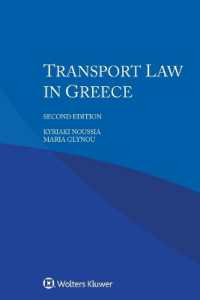- ホーム
- > 洋書
- > 英文書
- > Literary Criticism
基本説明
Rewrites the literary history of the last 400 years from the perspective of literary worldedness - producing a more global and less Eurocentric theory of literary development.
Full Description
Though literature is not a technology, the historical models literary scholars use to describe literary history owe a great deal to the languages of originality, novelty, progress, and invention that core of the idea of technological development. No real surprise: putting progress at the center of historicity is one of the things that makes us moderns. But if you think like a modern person then it's very hard to ever really make a good case for why someone interested in the history of modern literary aesthetics ought to read the literature of the non-Western world.
On Literary Worlds makes that case. It does so by rethinking from the ground up our concepts of literary history and progress, redescribing the history we know (or think we know) in a new language that requires us to be far more worldly and global in our arguments about literary change.
To do, so, the book begins with an argument that literature is a world-creating activity. If that is true, then a number of scientific and economic discourses (globalization, e.g.) often considered as in some way outside of or "beyond" literature ought instead to be thought of as coeval with it, as partners in humanity's ongoing attempts to think about the nature of the world. The book reads those attempts as "cosmographies" whose social force, measured against the scientific, geographic, and philosophical history of world-concepts, shapes the "physics" of the socially possible. This theory of the cosmographical imagination leads to a claim that thinking worldedness revises existing models of literary history. Connecting the cosmographical imagination to the historical shifts in world-view caused by the Columbian discoveries and Copernican revolutions, On Literary Worlds shows how the very notion of the modern is, at heart, a cosmographical social form.
The book does, therefore, three things: (1) it develops a vocabulary for the description of aesthetic worlds; (2) using that vocabulary, it rewrites the history of literature of the last 400 years; and (3) it criticizes the ways in which the institutional structures of literary study distort or limit our capacity to think about historical time.
Contents
Acknowledgments ; Preface ; Part I: Literary Worlds ; 1 The World and the Work of Art ; 2 Worlds, Literature, Systems ; 3 Literary Worlds ; 4 First Propositions ; 5 Aspects of Worldedness ; Part II: Modes of Modern Literature ; 6 The Planet and the World ; 7 Universalism as a World View ; 8 Realism, Romanticism, Modernism ; 9 Six Variables, Three Modes ; Part III: Ideologies of the Institution ; 10 Against Periodization ; 11 Institutional Problems Require Institutional Solutions ; Part IV: 4 Appendices ; 12 The Empty Quadrant ; 13 Medium and Form ; 14 On the History of Reality ; 15 Beyond the Modern








